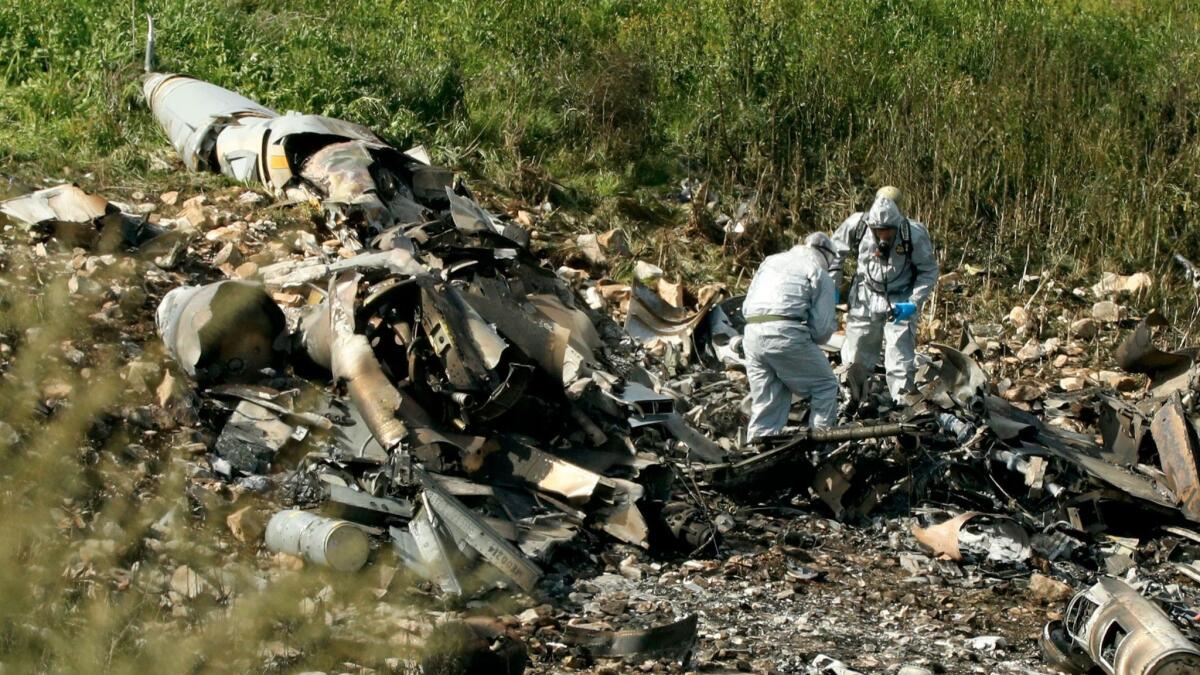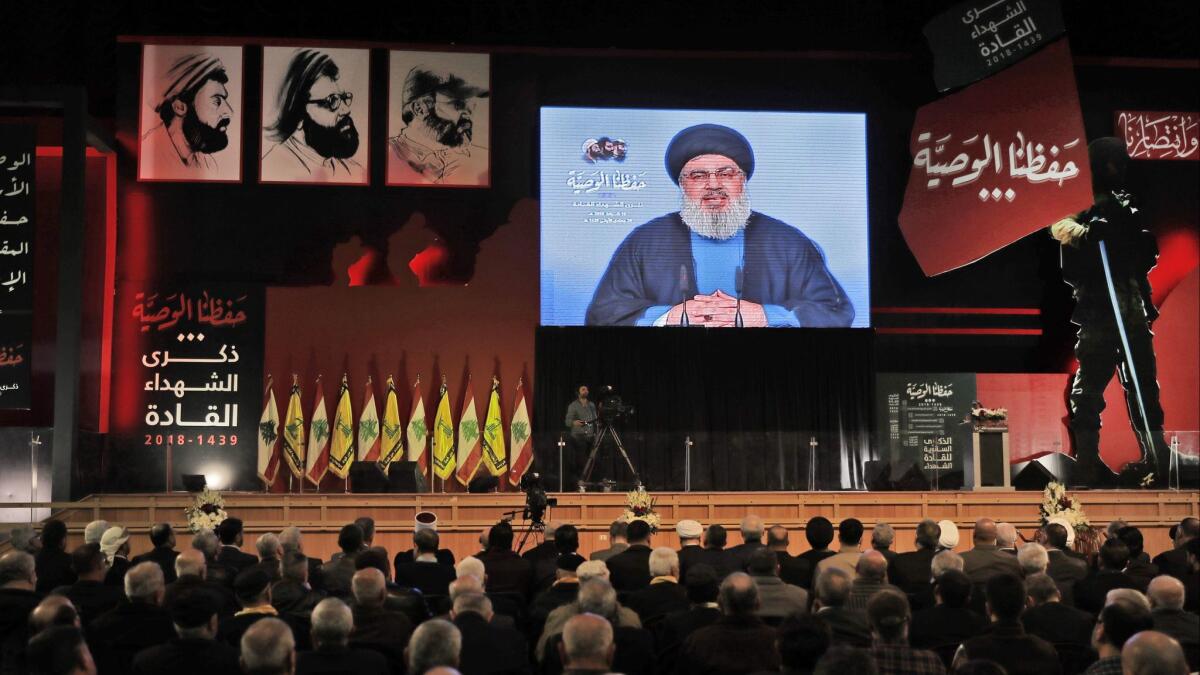The bucolic north of Israel is relatively peaceful for now. But the specter of war is looming

Reporting from Galilee, Israel — With emerald green meadows, hillsides terraced with grapevines, and cranes and falcons flying overhead, Galilee looks nothing like a front line.
Most weekends, this region in northern Israel resembles an alpine resort in springtime, with tourists crowding into wineries and restaurants, hikers exploring ancient ruins and cyclists swishing by.
For the record:
5:15 p.m. March 8, 2018An earlier version of this story stated incorrectly that Israel’s only interventions in the Syrian conflict have been bombing convoys of Iranian-made missiles crossing Syria on their way to Hezbollah bases in Lebanon. In fact, Israel has also provided humanitarian aid -- food, clothes, blankets, baby formula and medical assistance -- to the residents of a narrow band of territory within Syria east of the Israeli-occupied Golan Heights. That aid has been directed toward civilians, but in some cases rebels have received medical care.
But war is lapping at this landscape. It seems so close that the Israeli army has already named it: the First Northern War.
Since the start of the Syrian civil war in 2011, Israel’s northern borders with Lebanon and Syria have been fused into a single hostile realm in which it seems increasingly likely that Israel will be forced to confront its most dangerous enemy: Iran.
Israel and Lebanon have been in a formal state of war since the establishment of Israel almost 70 years ago, but their armies have never engaged in battle. Locals are fond of pointing out that until the 1970s, the Israeli-Lebanese border was Israel’s quietest.
War has broken out here twice. In 1982, Israel fought the Palestinian Liberation Organization. In 2006, the enemy was Hezbollah, Lebanon’s Shiite Muslim militia.
Iran has turned Hezbollah into the world’s most powerful nonstate military force — and its proxy to threaten Israel.
It has more than 25,000 active combatants, an equal number of reservists and a growing commitment to keeping Syrian President Bashar Assad in power and helping Iran realize its ambitions for influence in the Middle East.
Iran is spending at least $200 million a year arming and maintaining Hezbollah’s several thousand troops in Syria, according to U.S. and Israeli officials. It is also building missile factories in Syria and Lebanon.
Israel has vowed to prevent those from going into operation. It has also bombed convoys of Iranian-made missiles crossing Syria on their way to Hezbollah bases in Lebanon.
But Israeli army assessments say that Hezbollah already possesses more than 120,000 missiles and that it “will launch a thousand rockets a day” in any future war.
“Hezbollah, Hezbollah, Hezbollah,” a senior Israeli officer said describing his assignment in the north.
The United States, Israel, Europe and much of the Arab world define it as a terrorist organization, but its political wing forms part of Lebanon’s government. The group’s bright yellow flags fluttering above outposts in southern Lebanon are visible from several Israeli towns.
Hezbollah relies on the Lebanese army’s infrastructure as part of its groundwork in southern Lebanon. Yet Israel considers the Lebanese army and Hezbollah to be separate entities.
“From my point of view, the Lebanese army is not my enemy,” said the Israeli officer, who was not authorized to be quoted by name. “If war breaks out and the Lebanese army doesn’t get involved, I won’t target it.”
Last month, Israelis living along the border got a taste of just how such a war could start.
One Saturday at dawn, Iran sent a drone from one of its bases in Syria into Israel, which intercepted it and struck back by bombing Iranian and Syrian bases in Syria. Returning from the mission, an Israeli F-16 was downed by Syrian antiaircraft missile — the first air force jet lost by Israel since the 1982 war in Lebanon.
This time, the fighting ended with one incident. In a report released this week, Israel said it does not know why the drone was launched, leaving open the possibility that it had accidentally veered into Israeli territory.
Galilee has been subject to missile attacks and terrorist incursions from the north for as long as Israelis have been here. Perhaps that is why occasional booms from across the border in Syria have done little to rattle the locals.
“I don’t personally feel any threat,” said Yuval Hargil, the 47-year-old owner of Jullius Craft Distillery. “But yeah, you feel it, that readiness. In recent weeks you see a lot of army around, trucks, soldiers. It’s a tense feeling, preparedness, something in the air.”
Hargil, who was stationed in Lebanon during his regular army service in the late 1980s, now lives in Kibbutz Hanita, a communal village in Israel’s far north, and produces prize-winning liquors including Akko — his “Wild Gin of the Galilee.”
Shimon Guetta, who heads the Maaleh Yosef Regional Council, which encompasses 22 communities, said he doesn’t spend much time thinking about the security situation .
“It’s a serious threat, of course,” he said. “The reports we get from the army say it’s very volatile these days. But there’s not much I can do. For that we have a strong army and a government.”
The psychological war has already begun. In December, after President Trump’s decision to recognize Jerusalem as Israel’s capital, Hezbollah Secretary General Hassan Nasrallah addressed tens of thousands in Beirut, telling them his organization was almost done fighting in Syria and would now “give all its time” to combating Israel.
“We will be millions of martyrs to sacrifice for Jerusalem,” he said, adding that it was “the beginning of the end of Israel.”
Israeli Intelligence Minister Yisrael Katz responded that Lebanon would be bombed “to the Stone Age” if Hezbollah were to attack.
Israel’s defenses range from a fence equipped with motion sensors to its air force, the most dominant in the region. The newest component is a wall, erected in two sections, meant to deter incursions like the one that sparked the second Lebanon war.
In July 2006, Hezbollah fighters attacked two armored Israeli Humvees patrolling the border, killing three soldiers and kidnapping two. Israel retaliated by bombing Hezbollah bases, almost all in southern Lebanese villages.
More than 1,200 Lebanese and 165 Israelis were killed in the 33 days of war that followed.

Both Israel and the United Nations say Israel’s new wall, which is reportedly 23 feet high and made of reinforced concrete, is built on Israeli land.
Lebanon disagrees. Saying his country “doesn’t consider the so-called Blue Line” — the internationally recognized border — “to be the final border,” President Michel Aoun has denounced construction of the wall as “Israeli aggression.”
Tension has also escalated over Lebanon’s decision to issue public tenders for an offshore oil and gas platform in disputed waters.
In a speech last month, Nasrallah warned that his group could attack Israel’s gas fields. “If you bomb, we will bomb you…. I promise you, within hours they will cease operating,” Nasrallah said.
Reporters recently asked the head of Israel’s ground forces, Maj. Gen. Yaakov Barak, to define his aim of a “decisive victory” against Hezbollah.
He replied: “If we manage to kill Nasrallah in the next war, I would see that as achieving a decisive victory.”
Meanwhile, the officers on the ground continue to prepare. Lt. Col. Amir Friedman, deputy commander of the Northern Command’s Brigade 300, said: “I tell my soldiers they need to be like coils, quiet, but ready to leap at any given moment.”
Friedman’s brigade recently participated in a massive exercise in which armored corps, engineering units, infantry and artillery forces drilled for war and the possibility they would soon be crossing into Lebanon.
“Go around here any Saturday, look at the amount of visitors, the crowds, people from every part of Israel, and wow — that’s the measure of my success,” he said. “If despite all the warnings, despite the news people read, despite the tensions and despite Nasrallah, people feel safe enough to come up north, I’ve done my job.”
Tarnopolsky is a special correspondent.
More to Read
Sign up for Essential California
The most important California stories and recommendations in your inbox every morning.
You may occasionally receive promotional content from the Los Angeles Times.










